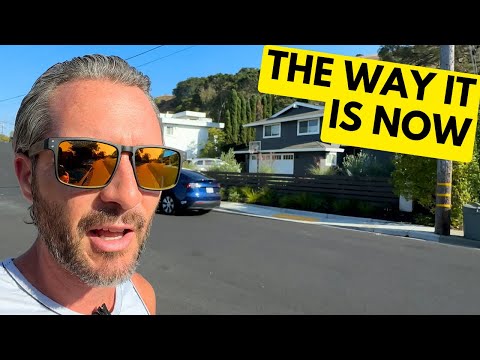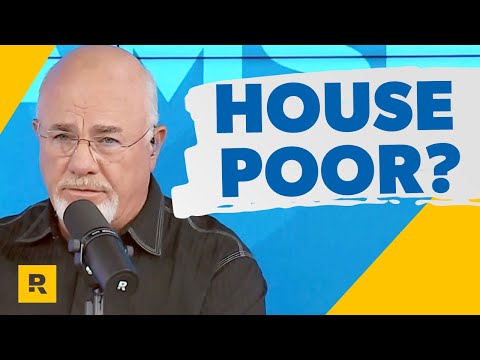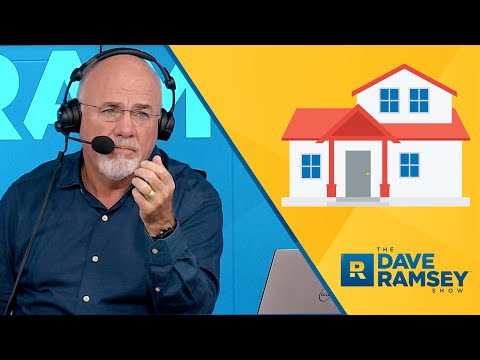A Contemporary Reality: The House Poor Situation in 2024
What does it mean to be house poor? The straightforward telltale definition is simple: If you’re spending too much of your income on housing expenses, relative to your earnings, leaving little or no money for savings or picking up other bills, you’re house poor. This dire financial state often creates a perpetual cycle of debt – a never-ending dance with the devil, akin to treadmilling toward the finish line, but in reality, the finish line keeps moving farther away. Then, your once-called ‘home-sweet-home’ quickly turns into your financial nightmare, and the house poor meaning starts becoming your dreadful reality. Your safety net is gone, with all your money sinking into the property version of a bottomless pit.
Today, about a whopping 27.4% of Americans have become house poor, spending over 30% of their income on housing costs, according to a Chamber of Commerce report based on Census Bureau data. This phenomenon, a true embodiment of house broke, where homeowners end up buying homes beyond their budget line, only results in a downward spiral. Sadly, we’ve shifted from a time when our home was our sanctuary, to a period where it’s rapidly becoming our albatross, a testament to the grim reality of being house poor in 2024.

Analyzing the House Poor Crisis: Why it is More of a Burden Today

Transitioning to the question, why so many of us become house poor? The causes are more profound than merely the cost of a house itself. The impact is wide and hard-hitting, straining not just our financial prospects, but affecting us emotionally, mentally, and socially.
Entering house poor feels like being in the middle of a raging storm. The financial burden is heavy. With all earnings geared toward the mortgage, bills, repairs, and home-related expenses, discretionary spending takes the backseat. Much-needed vacations? Maybe next year. A nice dinner with loved ones? Perhaps when the debts are covered. It’s no wonder the house poor meaning resonates with stress and deprivation, but here’s the trick: prioritization is key.
Another critical contribution to this issue is the 28/36 rule, which isn’t necessarily as realistic as thought. Figuring out 25% of your take-home pay is a smart strategy, so your monthly mortgage payments don’t eat up more than that. However, when property values keep inflating like a balloon ready to burst, while wages feel like a static line on the graph, that rule starts shaking on its foundation.

| Subject Matter | Explanation | Implication | Date of Update | Key Takeaway | Supporting Data |
|---|---|---|---|---|---|
| :————– | :———– | :———– | : ————: | :———— | :————– |
| House Poor | It means spending an exorbitant percentage of income on housing costs, leaving little for savings, other expenses, and resulting in accumulating debt | This could potentially lead to a scenario where homeowners end up buying beyond their means, making their home an albatross | Jul 24, 2023 | We need to avoid spending all our income on housing costs | About 27.4% of Americans are house poor, according to a Chamber of Commerce report |
| House Broke | Similar to being house poor, it’s when homeowners have bought homes beyond their means and end up spending all their income on repairs and expenses | This situation can forego vacations and discretionary spending due to heavy spending on housing costs | Mar 29, 2023 | We should not buy homes beyond our means to avoid becoming house broke | None |
| 25% House Affordability Rule | Never spend more than 25% of monthly take-home pay on monthly mortgage payments, helps to avoid becoming house poor | Following this rule, if not, can potentially lead to house-poor scenario | Aug 15, 2023 | A useful rule to avoid buying too much house and ending up house poor | None |
| House Rich, Cash Poor | Indicates a situation where you have equity in your home but insufficient liquid assets for savings and spending | Following this tendency might result in becoming house-poor as there won’t be enough savings or spending ability | Mar 26, 2023 | We should have sufficient liquid assets along with equity in homeownership to avoid being house rich, cash poor. | None |
| The 28/36 Rule | This is not a hard-and-fast rule, lenders may consider other factors while approving a mortgage. According to this rule, maximum 28% of your income should be spent on housing expenses. And the total of your housing expenses plus any other monthly debts should not exceed 36% | Seems to be a bit unrealistic, considering the current property values increasing while wages being stagnant | Jul 12, 2023 | It’s important to take other financial factors into consideration while deciding on mortgage rates | None |
Transforming the House Poor Narrative: Strategies Toward a Financially Balanced Home Ownership
So much for dissecting the house poor situation. Now to the heart of our discourse: How can we overcome this imminent financial crisis? Here are five transformative strategies that can usher in a turning tide.
Cutting Back and Budgeting: It’s not rocket science. Reducing unnecessary expenses and budgeting can free up capital for savings and other needs. Keep track of your spending and look for areas to trim without compromising too much on lifestyle.
Refinancing and Revising Mortgage Terms: When handled smartly, this move can bring some serious relief to individuals finding the mortgage terrain hard to navigate. Note, though, that it’s not without its risks. Grasp the real gist Of purchase apr meaning before stepping into this chapter.
Smart Home-Buying Tactics: Do your research. When buying a new property, considerations go beyond the purchase price. Think about extra costs, location, and how much house you can practically afford. Ask yourself, can you really shoulder this without stepping on the house poor landmine?
Exploring Other Income Opportunities: Look into the vast landscape of earning opportunities besides your regular gigs. From short-term rentals to profitable side hustles, use the 2024 market trends to your advantage, lighten the house poor potential.
Professional Financial Advice: Not everyone can be a rowdy cowboy in the house market, completely understanding the house poor meaning without a yippee-ki-yay cowboy guide. Professional perspectives from reliable financial advisors can offer viable, personalised strategies to outsmart the house poor trap.

Escaping the House Poor Distress: Implementing the Transformation
Now that we know the ropes of escaping our house poor narrative, it’s about time we start working on it. Hurdles may come, sometimes even in galore. But hey, even Rome wasn’t built in a day!
Bear in mind the lessons from people who successfully shifted from house poor to home-rich, keep their words in your arsenal for the days ahead. Be the captain of your ship. Plan, execute, monitor progress, and repeat. Other financial obligations you might have had in the past shouldn’t have the best of you. Just remember, this journey reminds you why being house poor ended up being your unwanted guest in the first place.

Future-Proofing Against the House Poor Phenomenon
Going beyond the present issue, let’s analyze future trends. Well-informed predictions and insights about homeownership, mortgages, and ways to prevent the house poor issues post-2024 can aid you in smarter decision-making. Subsequently, adopting these proactive steps can significantly contribute to proofing against becoming the house poor “victim.”

Home Ownership Revolution: Beyond the House Poor Syndrome
A long journey full of trials and triumphs can help turn around the problematic house poor scenario, bringing in the dawn of proactive homeownership marked by financial stability. Your house, instead of being a financial burden, reverts to its rightful place as your haven of rest, peace and joy. The challenges and success stories strengthen the importance of staying informed, practising prudence, and moving toward a balanced equation of home ownership and financial wellness.
With the curtain falling on our 2504-word saga of the house poor in 2024, we realize that the path toward financial stability isn’t a sprint but a marathon. So keep your shoes laced up and your vision clear, for each stride counts. Watch as your dream home goes from being your fiscal doom to your financial boon. Step out of being house poor, and be ready to welcome the dawn of a home-rich era.
What is an example of house poor?
Whew, to be house poor basically means you’re spending more dough on house-related costs than you can afford. Here’s an example: let’s say you’re blowing over 30% of your income on mortgage repayments, leaving you strapped for cash and unable to stash any savings. It’s like your house is eating all your hard-earned money, leaving you poor, mate!
How do you calculate house poor?
How do you calculate being house poor, you ask? Well, it’s not rocket science! When you’re spending over 30% of your total income on costs related to housing—like mortgage, utilities, maintenance—and it’s leaving you financially constrained, voila, you’re house poor.
Is it house rich or house poor?
Ah, it’s not house rich OR house poor—it’s house rich AND house poor! You see, being house rich means your home’s value goes through the roof, but house poor means your home’s costs are burning a hole in your pocket.
Is the 28 36 rule realistic?
Is the 28 36 Rule realistic? It’s your call, really! While it’s a useful thumb rule when buying a house, everyone’s financial circumstance is a bit different. Note, this rule suggests that your housing costs shouldn’t exceed 28% of your gross income and all debt service shouldn’t be over 36%.
Is it smart to be house poor?
Is it smart to be house poor? Generally-speaking, a big fat NO! It can put you in hot water if there’s a downturn in the market or if you face an unexpected bill. So keep an eye out, folks!
What income makes you house poor?
What income makes you house poor? Well, uh-oh, there’s no fixed number! If housing costs make up more than 30% of your income, and your wallet feels the pinch, then you might just be house poor.
How much house does $3,000 a month buy?
Now onto, how much house can 3 grand a month buy? Well, it hinges on factors like interest rates, your loan term, and property taxes. On average, with a 30-year mortgage and an interest rate of 4%, you could probably swing a home worth about $630,000.
How much house can I afford if I make $70,000 a year?
If you’re drawing in $70,000 a year, the amount of house you can afford again depends on that pesky interest rate and loan term. But there’s a general rule-thumbs-up suggests you could afford something in the ballpark of $280,000 with a 30-year mortgage.
How much house can I afford if I make $40000 a year?
Making $40,000 a year and wondering how much house you can afford? Factoring in interest rates and loan term, you might be looking at a home valued at about $160,000.
Is being house poor normal?
Is being house poor normal? Unfortunately, with rising house prices and stagnant wages, it can be all too common. But don’t mistake common for ideal, dear reader.
Do rich people pay off their homes?
Do rich people pay off their homes? Well, it’s up to them, really! Some prefer to invest their bucks elsewhere and keep a mortgage going, while others enjoy the feeling of owning their home outright. No hard and fast rule here.
Do most millionaires pay off their house?
Do most millionaires pay off their house? The million-dollar question, indeed! Some do, while others leverage their mortgage for other investments. Again, it varies from person to person.
How much home can I afford with 100k salary?
With a 100k salary, you could potentially afford a house around $400,000, based on the assumed interest rate and loan term. All said and done, always make sure your numbers add up!
What is the 2% rule for mortgages?
The 2% rule for mortgages is a handy little tool. It suggests that the monthly rent of a property should be at least 2% of the purchase price for it to be a good investment. But, it’s not the be-all and end-all, mind you!
What is the 10 15 rule mortgage?
As for the 10 15 rule in mortgage, it’s a standard suggesting your mortgage payment should be no more than 15% of your monthly income, and you should aim to have it paid off within 10 years. You know what they say, rules are made to be broken!
What does it mean to be home poor?
Being home poor? It’s another phrase for being ‘house poor.’ In a nutshell, it means your housing costs are bleeding your finances dry, not leaving you much wiggle room for anything else.
What is meant by being house poor?
As for what it means to be house poor, it’s when your house-related costs like mortgage, utilities, or repairs, gulp down a big chunk of your income, leaving you high and dry. Mate, it’s like your house is raiding your bank account!
What are the characteristics of a poor house?
The characteristics of a ‘poor house’? It’s not about the house being literally ‘poor,’ it’s about the financial mess it puts you in. Think: spending most of your income on the house, having little to no savings, and falling into debt!
What is an example of being poor?
An example of being poor? Well, it’s when your income doesn’t match up to your living costs, resulting in inability to pay for necessities, constant financial stress, and a lack-of savings. It’s a tough spot to be in, folks!



